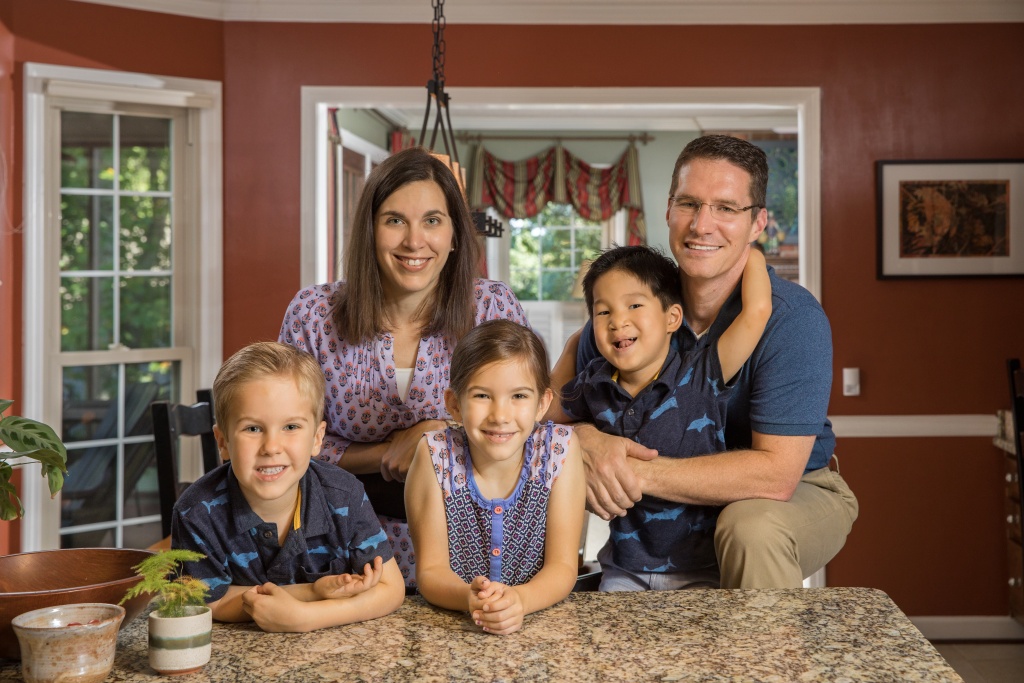“Adoption is basic Christianity.” Those words, written in an email we received a decade ago by a twenty-four-year-old BJU graduate working as an English teacher in China, set us on a path to adoption. She and her husband intended to live in China for a year. They stayed for five because shortly after they arrived they discovered an abandoned newborn with severe medical conditions. They secured medical help for him and fostered him for five years until he was introduced to both Christ and his forever family in America.
I had many assumptions about what constitutes “basic Christianity,” but adoption wasn’t on my list. It is now. And that’s because of the text the foster mother included in her email.
“Religion that is pure and undefiled before God, the Father, is this: to visit orphans and widows in their affliction, and to keep oneself unstained from the world.” — James 1:27
Adoption is emphasized in the Bible.
The Bible says a great deal about caring for the fatherless. Deuteronomy has eleven references enjoining the twelve tribes to reflect the character of God by caring for orphans, widows and sojourners in the land. Isaiah promises that God will wash away the scarlet sins of his people. And when they are cleansed, they will bring justice to the fatherless. Jeremiah declares that caring for the fatherless was a prerequisite to Israel’s living in the Promised Land.
The New Testament is equally emphatic. Its first chapter records the genealogy of an adoptive Father. At the end of the line is a young Palestinian heir of the Abrahamic and Davidic covenants named Joseph. And the success of both covenants hinges on a fateful decision. Will Joseph adopt Jesus? Paul tells the Romans they claim their adoption whenever they cry “Abba! Father!” And James 1:27 has compelled thousands of Christian families to scour the globe for hungry, abandoned and unloved children and to bring them home and into the promises of the Abrahamic Covenant.
Our son Asher came home from China in September 2016. (My wife describes the flight from Beijing to Detroit as her labor and delivery.) Asher’s first two years were spent in an orphanage. He had been abandoned at birth on the side of the road with the detritus of human civilization. A cleft lip and palate etched the curse into his face. His Certificate of Intercountry Adoption of the People’s Republic of China states his birth identity: “Foundling.” But it also states his new identity: “Asher Ren Cook” and his new address. Asher’s last name and address happen to be my own, and my full name appears under the title “Father” on the certificate. The adoption is irrevocable.
Adoption illustrates the Gospel.
When we began telling Asher’s story, we realized we were illustrating the Gospel. True, Asher has no biological relationship to me. But we share the same story. I was a foundling abandoned in a fallen world without hope. The curse was indelibly etched into my humanity. But a Redeemer came from another world to give me a new name, a new Father, a new family and a new home. Asher is a living, daily illustration of the Gospel to my two biological children.
The question we now encourage every Gospel-believing family to ask is not “Why should we adopt?” The question is “Why shouldn’t we adopt?” Christians alone have a worldview that justifies adoption because Christianity uniquely has a doctrine of incarnation. God became human and was adopted into a human family by Joseph. But ironically, Joseph’s Son was the Redeemer who adopted Joseph into the family of God.
Many Christians have never considered adoption theologically. They view adoption as a second-rate alternative for families who fail to produce biological children. But that attitude fails to see adoption through the lens of the incarnation or the hungry eyes of an orphan. I recently read the story of a Chinese boy who said the dream of every child in an orphanage is to belong to a loving family. Because of his special needs he had been passed over for adoption many times, while the other orphans went home with their families. But at age ten, a Christian family finally came for him. Christians need to answer a simple question: If we don’t adopt, who will?
Some may wonder whether they can love an adopted child the way they love a biological child. It doesn’t take long to discover the question is easily answered. Can you love a spouse who has no biological relationship to you? Genes are not important. Mine could be improved.
Adoption emphasizes holy living.
James 1:27 presses an important theological question on believers considering adoption. What does the Bible mean when it calls us to a life of separated, holy living? James insists that Christians simultaneously keep themselves unstained from the world even while engaging the orphan and widow.
In the parable of the Good Samaritan the priest and the Levite separated themselves from both the crime and the victim by descending the wrong side of the road. But the Samaritan crossed the road and condemned the crime of robbery by staining his hands with the blood of the victim. Biblical separatism engages. Basic Christianity calls us to separate from a world that aborts and abuses and abandons its children by engaging those children, claiming them as our own.
Adoption brings opportunities.
At the conclusion of the parable, Jesus says, “Go and do likewise.” Those words have sent thousands of Christian families on journeys into all the world looking for lost sons and daughters. We recently met a family with four adopted daughters from China, all with special needs, some severe. In downtown Greenville the owner of a Chinese restaurant graciously hosts families of Chinese adopted children for Chinese New Year. At last year’s celebration we met a young boy from our son’s same orphanage. We also met several adopted children who, like Asher, have repaired cleft lips and palates. (If you ever see a gaggle of adults in a Chinese restaurant poking around the open mouths of several Chinese children, you’ll understand why.)
Adoption also brings the world to you. A visiting scholar from China recently attended our church. Following the morning service, he greeted me and said, “Let me introduce my son,” pointing to a little Chinese boy. Not to be outdone, I said, “Let me introduce my son,” pointing to a little Chinese boy. The man has been coming faithfully ever since.
More recently I engaged another visitor from China in our church, telling her Asher’s story. She was astonished to learn Asher was from her home city. She returned with her husband to the next service. With out-stretched arms he asked if he could embrace Asher. In broken English he thanked us repeatedly and joyfully for claiming Asher as our own.
Adoption also introduced us to our neighbors. A year ago, a Christian family with two adopted girls from China moved in across the street. Our case study worker told us of a family in our adjoining neighborhood who resembles our own. The parents are BJU graduates. And they have a son from China who shares Asher’s story—same age, same medical conditions, same surgeon, same early interventionist, same speech therapist. The boys don’t share toys yet, but we’re working on that.
Our prayer is that Asher’s story will inspire others to begin a happy adoption journey of their own. I often reflect on a photograph Anne took in Asher’s orphanage in China. It shows six faucets protruding from a long metal industrial sink bolted down to a white tile floor. A mirror runs the length of the sink. Exposed plumbing snakes through portals in the white-tiled wall. Screwed into the wall are six long metal shelves. A perfectly aligned series of pink, green and blue plastic cups crowd the shelves. And each cup holds the toothbrush of an orphan waiting for a family. Asher’s cup is gone. But sixty-two remain.








